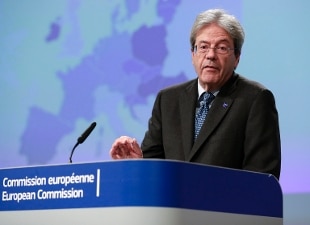Share
February 26, 2020 "Certainly" in Europe there will be an "economic impact" of the Covid19 epidemic "and, in the face of this economic impact, it will be necessary to coordinate between European countries to adopt counter-cyclical measures, which favor expansion and avoid risks of recession, "said European Commissioner for Economy Paolo Gentiloni in Brussels.According to Gentiloni, the impact of the epidemic cannot be calculated at the moment and will depend on the duration, but certainly the consequences will be "enormous" on both the global and European economies. And Italy could pay a heavy price
No panic or unnecessary closures
The European Union works for a "coordinated" response, without "panic" or "unnecessary closure of borders", to the spread of Covid 19, underlines Gentiloni. The EU "works to make a contribution, as a European Commission, to address the emergency, that is to protect the health of European citizens, which is particularly important for Italy", adding that "protecting the health of citizens means moving in a coordinated way, without panic and without unnecessary closure of borders, because this is the basis for facing a difficult situation in these days ".
"We monitor the performance of the various industrial sectors - says Gentiloni - and Chinese tourism represents 4% of tourism in Europe. It is also true that the alarm in some European countries can add to this impact" on the tourism sector in Italy , resulting in a much "stronger" one that derives from the absence of tourists from China.
"For this - Gentiloni continues - the first message to be given is a message of protection, of following instructions from government and health authorities, but avoiding unnecessary spread of panic".
The presentation of the Country Reports
The Commissioner spoke at a press conference to present the Country Reports for each of the Member States. It is clear that there are three European countries with excessive "macroeconomic" imbalances: Italy, Cyprus and Greece, "said the European Commissioner for Economic Affairs. Nine countries that instead present "imbalances", including: France, Germany and Spain.
With the Country Reports, the EU Commission analyzes the major socio-economic challenges of each Member State. The analysis presented in the country reports follows the lines of the annual sustainable growth strategy presented in December 2019, focusing on competitive sustainability to build an economy at the service of people and the planet.
"Today we are taking the first step on the path that will bring sustainability to the center of EU policy and economic action," said Gentiloni, adding that "Country Reports 2020 take stock of progress made in pursuing development goals United Nations and include a section specifically dedicated to environmental sustainability ".
Green deal: EU funds for Taranto and Sulcis
Taranto for the former Ilva settlement and the coal mining area of Sulcis have been identified by the European Commission as possible beneficiaries of the Fund for the 'just transition' within the framework of the Green Deal, indicated Gentiloni, adding that the officials of the Commission "work with States to identify which industrial plants or regions are best suited to the 'Just Transition' Fund; authorities will need to present environmental transition plans under which funding is obtained. '
The portion of the Fund available to Italy has already been indicated at 364 million euros. In the report on Italy, the Commission indicates that the two areas, in Puglia and Sardinia, deserve specific attention.

